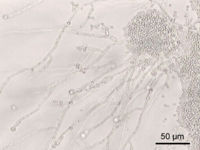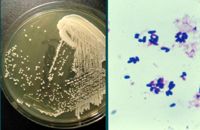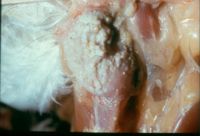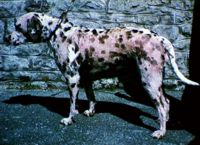Difference between revisions of "Category:Fungi"
(Created page with 'thumb|right|200px|''Candida albicans'' - wikimedia commons ==Introduction== There are many different organisms in the fungal lineage which include…') |
(No difference)
|
Revision as of 13:09, 29 April 2010
Introduction
There are many different organisms in the fungal lineage which include mushrooms, rusts, smuts, puffballs, truffles, morels, moulds and yeasts, as well as many lesser known organisms. fungi are eukaryotic and heterotrophic organisms which posess a chitinous cell wall. Sexual and asexual reproduction of the fungi is commonly via spores, often produced on specialized structures or in fruiting bodies. Some species have lost the ability to form reproductive structures, and propagate solely by vegetative growth.
Fungi are abundant in soil, vegetation, water and on decaying material and wood. Fungi have a eukaryotic cell structure and are able to grow as branching or filamentous forms (mycelia) or as single cells (yeasts).
The study of fungi is called mycology. Fungi are fundamental for life on earth in their roles as symbionts and by playing a role in xenobiotics, a critical step in the global carbon cycle. Many fungi produce toxins, antibiotics, and other secondary metabolites, some of which cause diseases of animals (as well as plants).
Fungal Diseases
Dermatophytosis
Subcutaneous Mycoses
- Chromoblastomycosis
- Chromomycosis
- Epizootic Lymphangitis
- Eumycotic Mycetoma
- Hyphomycosis
- Pythiosis
- Rhinosporidiosis
- Sporotrichosis
Systemic Mycoses
- Adiaspiromycosis
- Aspergillosis
- Blastomycosis
- Coccidioidomycosis
- Entomophthoromycisus
- Histoplasmosis
- Zygomycosis
Yeast-like fungi
- Candidosis
- Cryptococcosis
- Geotrichosis
- Malassezia pachydermatis
- Rhodotorula
- Torulopsis glabrata
- Trichosporonosis
Antifungal Drugs
WikiWords
A glossary of the important concepts and terms in mycology
References
Special accreditation for the use of lecture notes, images and input from:
Professor Andrew N. Rycroft, BSc, PHD, C. Biol.F.I.Biol., FRCPath
Other Sources
- Carter and Chengappa: Essentials of Veterinary Bacteriology and Mycology, Fourth edition
Subcategories
This category has the following 4 subcategories, out of 4 total.
C
S
Y
Pages in category "Fungi"
The following 8 pages are in this category, out of 8 total.



